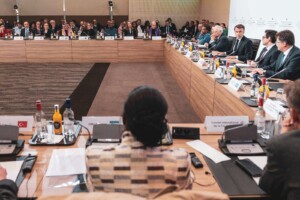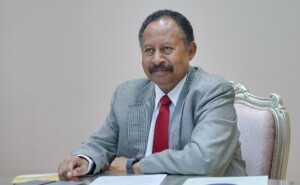‘Sudan government must do more to combat human trafficking’
According to the US-based African Centre for Justice and Peace Studies (ACJPS) Sudan has not made any measurable progress in combating human trafficking. It must also stop treating the victims as criminals.
 Human trafficking in Sudan (file photo)
Human trafficking in Sudan (file photo)
According to the US-based African Centre for Justice and Peace Studies (ACJPS) Sudan has not made any measurable progress in combating human trafficking. It must also stop treating the victims as criminals.
ACJPS calls on the transitional government to amend the Sudanese 2014 anti-trafficking law to criminalize sex trafficking of children when there is no coercion, and better define ‘sexual exploitation’ in the law. The government must also ensure that victims are not punished by the authorities for unlawful acts committed as a direct result of being subjected to human trafficking, such as women compelled to engage in commercial sex acts.
Sudan should increase efforts to prosecute and convict traffickers and complicit officials. It should also increase efforts to investigate, prosecute, and convict officials guilty of child soldier recruitment. It must cease all recruitment and use of child soldiers in all of Sudan’s military services.
Security officials must be trained to better distinguish trafficking from other crimes such as smuggling. Sudan should also, in collaboration with international organizations, develop a data collection and information management system to more effectively organise law enforcement data.
Horn of Africa
Millions of people in Sudan are at risk of human trafficking including refugees, asylum seekers and migrants from the Horn of Africa, especially young Eritrean fleeing military conscription, and Ethiopians fleeing conflict and poverty. ACJPS reports indicate that Eritrean women are forced to work as sex workers in Sudan. The Rapid Support Forces have enlisted minor refugees as child soldiers. Young Sudanese men have been sent as guards to war-torn Libya, instead of the United Arab Emirates, as they were promised by the security firm that hired them.
There are also thousands of Sudanese youths who see no prospects in Sudan because of the deteriorating economic conditions and the high unemployment rates. They choose to migrate to Europe or the Gulf states in search of a better life. Sudan was ranked by the International Organisation for Migration in 2019 as the fifth African country with the largest number of its people living abroad.
Prosecution
ACJPS monitors court cases of suspected human trafficking cases, which are rather rare. Between July and September 2019, ACJPS recorded just seven cases of human trafficking. 15 persons were accused. On 17 October 2019, the Kassala Public Criminal Court convicted one person for human trafficking and imposed a fine of 50,000 Sudanese Pounds ($ 1,000). Failure to pay the fine will result in three years imprisonment. In 2019, the Sudanese government reported that 45 traffickers were convicted under the 2014 anti-trafficking law.
The ACJPS says that the Al Bashir government failed to even prosecute police and border guard officials who facilitated abductions of migrants or allow potential victims to be transported across security checkpoints or international borders in exchange for money. ACJPS’ monitoring reports indicate that traffickers still pay money to border guard officials to avoid arrest.
The government’s efforts to provide victim protection face financial constraints, but the heart of the problem is that authorities view the victims as criminals. ACJPS’ monitoring indicates that law enforcement officers in Sudan have often detained victims in police cells, sometimes together with the perpetrators. Victims have also been punished for unlawful acts, such as prostitution, committed as a direct result of being subjected to human trafficking. In December 2019, ACJPS’ monitoring reports indicate that nine victims of human trafficking from Chad were ordered to pay 3,000 Sudanese pounds and are to be deported back to their country.
Financial support
In 2014 Sudan agreed to curb migration from the Horn of Africa into Europe in exchange for financial support from the Europe Union. However, with no protection mechanisms put in place by Sudan, migrants have allegedly been tortured by border guard forces and militia deployed by the government to stop migrants from crossing the border. Journalists and civil society activists have been threatened by security officers with arrest if they continue to collect data from and about victims and perpetrators.
Read the full five-page report on the ACJPS website.
Radio Dabanga’s editorial independence means that we can continue to provide factual updates about political developments to Sudanese and international actors, educate people about how to avoid outbreaks of infectious diseases, and provide a window to the world for those in all corners of Sudan. Support Radio Dabanga for as little as €2.50, the equivalent of a cup of coffee.










 and then
and then